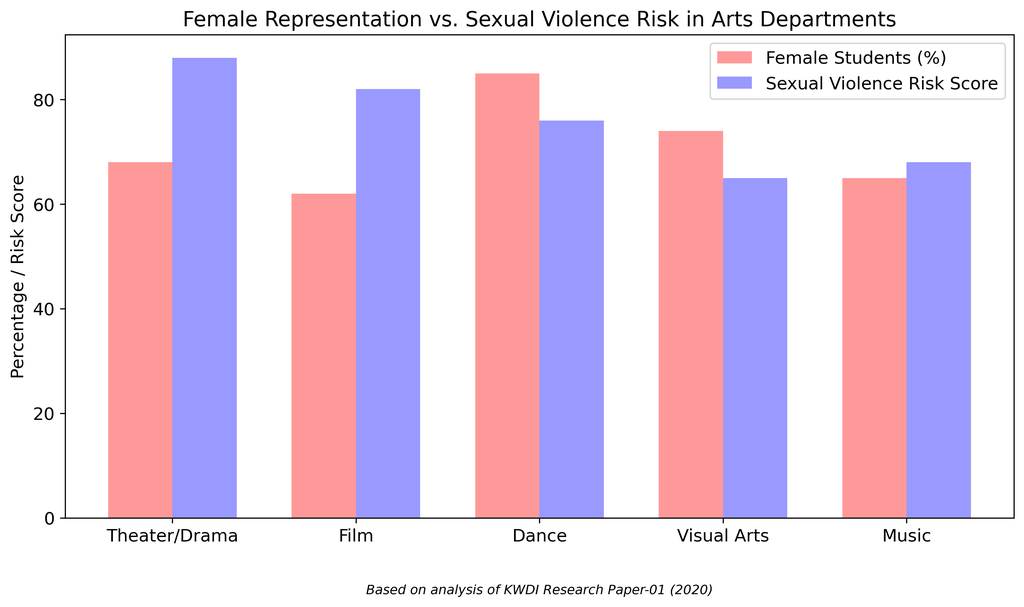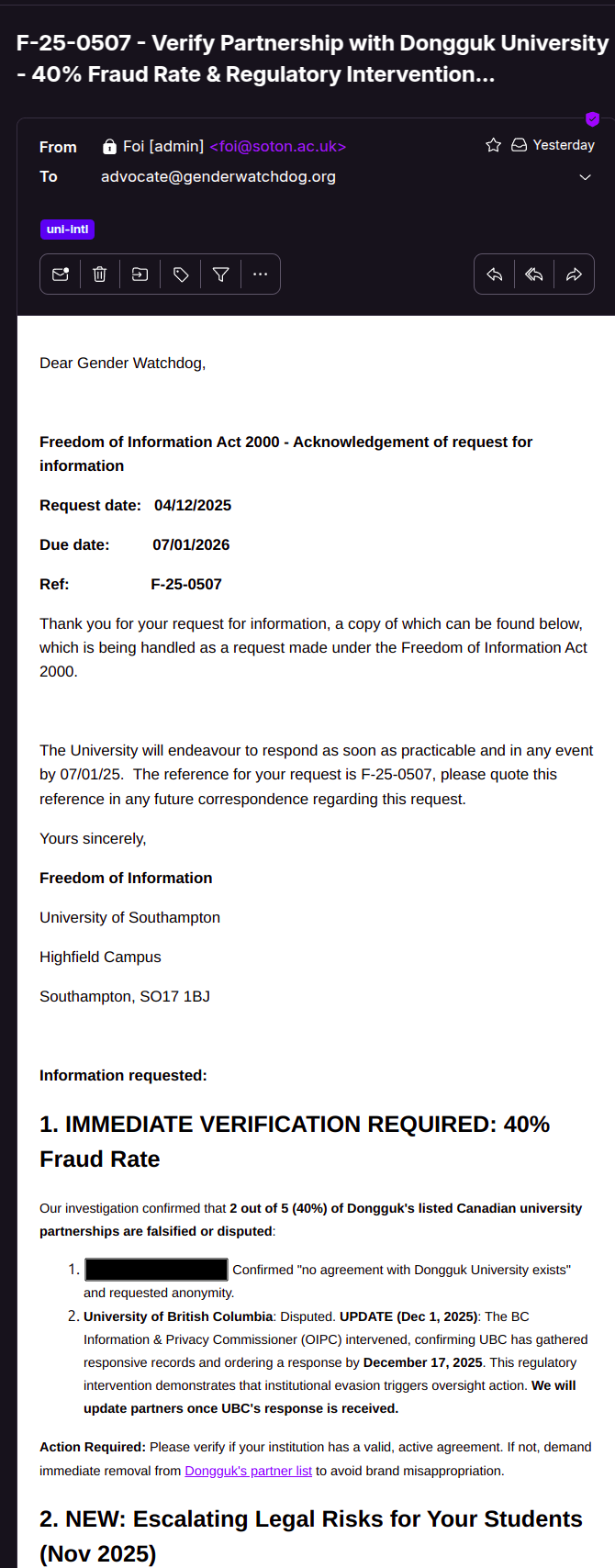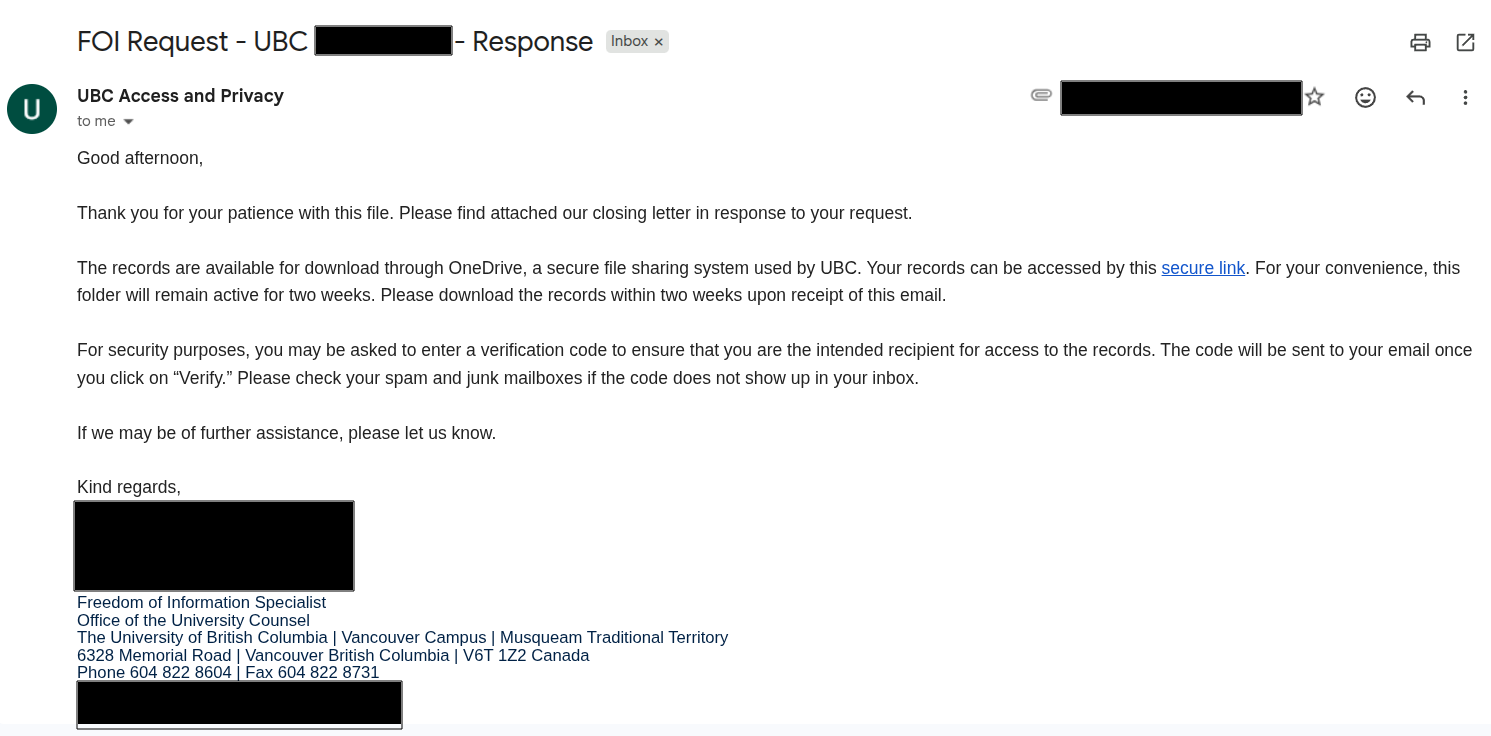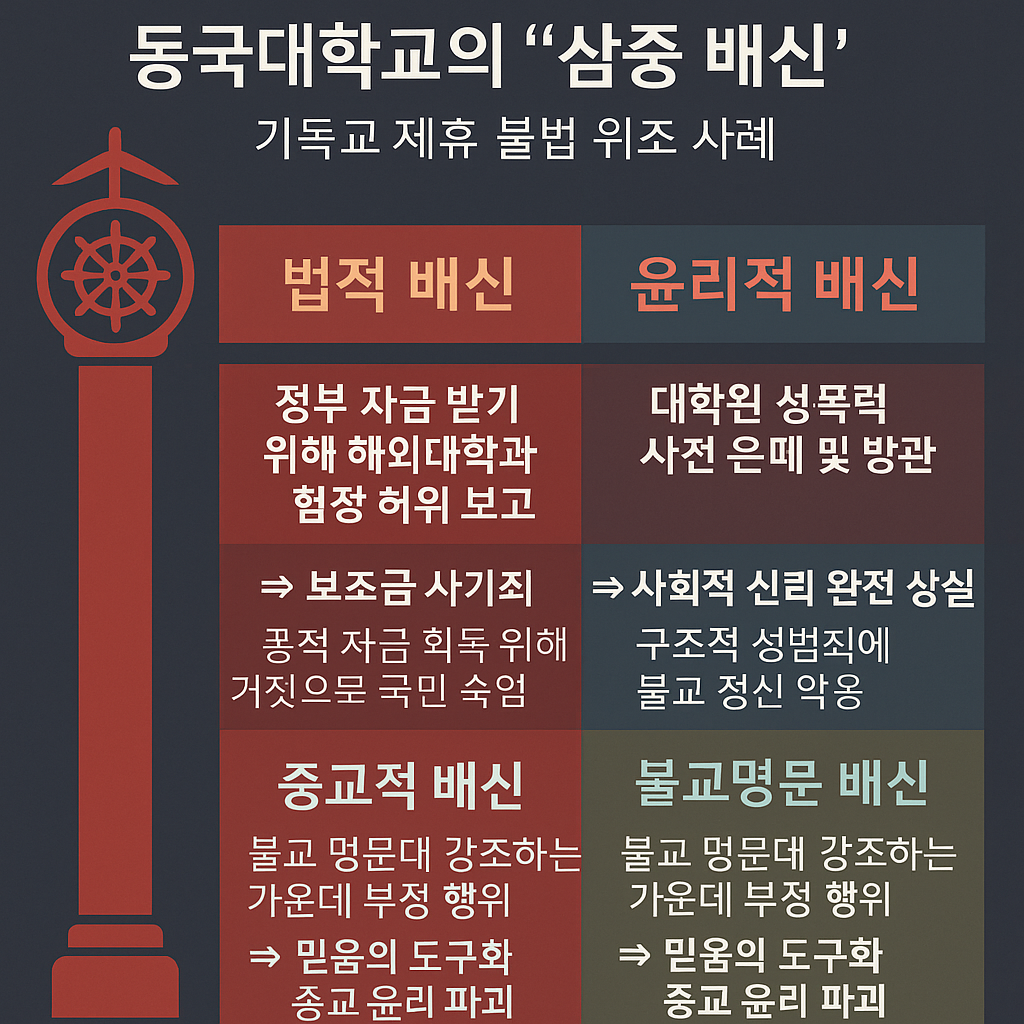Gender Watchdog documents cases of falsified international partnerships, alleged misuse of public funds, and racialized sexual violence at Dongguk University. The university's Graduate School of Digital Image and Contents, Department of Film has the highest sexual violence risk score (81/100) based on our analysis of Korean Women's Development Institute data. We examine how academic fraud and sexual violence intersect to target international students, analyze potential Title IX violations in international university partnerships, increase awareness, provide resources for survivors, and demand accountability.

 University of Southampton FOI Response: No partnership exists.
University of Southampton FOI Response: No partnership exists.
 UBC FOI Response: No active institutional agreement exists.
UBC FOI Response: No active institutional agreement exists.
Of female arts students experience sexual violence (Korean Women's Development Institute)
Of campus sexual violence is perpetrated by professors
Dongguk University film program's sexual violence risk score (Gender Watchdog analysis based on KWDI data)
The connection between structural racism and sexual violence in Korean universities revealed through Xiaohongshu testimonies
"被东国大老师歧视过🙋"
Translation: "I've experienced discrimination by a Dongguk University professor." - [redacted]([redacted]) user
"上个学期还有个影像大留学生被前辈性骚扰了"
Translation: "Last semester, a foreign student in the Imaging Department experienced sexual violence from a senior." - [redacted]([redacted]) user
These Xiaohongshu testimonies clearly show that international students at Dongguk University are experiencing dual victimization through racism and sexual violence. This is not mere coincidence but a systematic pattern where Korea's xenophobia and structural racism make foreign female students more vulnerable targets for sexual violence.
According to the Korea Herald article "'It's just subtle, not serious': What Koreans miss when downplaying racism," Korea ranked 5th out of 89 countries in the US News & World Report survey of "countries with the worst racial equity."
"There is little statistical data on crimes related to foreigners or racism, and there are no legal provisions to punish racial hate crimes"
- Professor Jeong Hoe-ok, Myongji University
"We compare ourselves to countries where people get shot or stabbed because of racial hatred and say 'it's not that bad here.' But we fail to see the daily discrimination and hatred that persists"
- Professor Park Kyung-tae, Sungkonghoe University
These structural problems and patterns of minimizing racism create an environment where foreign female students receive neither adequate legal protection nor social attention when they experience sexual violence.
As Korean universities aim to attract 300,000 international students by 2027, failure to address structural racism and sexual violence risks will result in:
The new government must ensure that Korean universities provide safe educational environments for all students—regardless of nationality.
Gender Watchdog's in-depth investigative videos documenting sexual violence cover-ups, false partnerships, and alleged misuse of public funds at Dongguk University
Examines Dongguk University's film program with the highest sexual violence risk score (81/100) based on Gender Watchdog's analysis of Korean Women's Development Institute data. Documents one confirmed denial of partnership from a Canadian university among 381 claimed partnerships, with 3 US universities confirming they will re-evaluate partnerships and ATIXA notified. Analyzes Title IX violation risks and potential government funding misuse through falsified partnerships.
Comprehensive analysis of the Korean Women's Development Institute's 2020 research findings on sexual violence in university arts and culture programs. Documents the 61.5% victimization rate among female students and systemic institutional failures across Korean universities.
These videos are based on reliable primary sources including the Korean Women's Development Institute (KWDI) report, government public records, and official university websites.
Gender Watchdog YouTube Channel: youtube.com/@GenderWatchdog for additional videos and updates.
Dongguk University claims 381 international university partnerships, with at least one Canadian university officially denying any partnership when contacted directly. This raises serious questions about the accuracy of their partnership claims and potential misuse of government funding.
Learn more: Evidence of false partnershipsDongguk University's Graduate School of Digital Image and Contents, Department of Film has the highest risk score (81/100) for sexual violence based on Gender Watchdog's analysis of Korean Women's Development Institute data. The department has an all-male faculty. Additionally, it is located in the "Choong-Moo-Ro Yeong-Sang Center" alongside Sidus FNH (one of Korea's top film production companies), blurring boundaries between industry and academia and increasing sexual violence risk to students.
Learn more: Risk analysis of film programsDongguk University disbanded its Women's Student Council in 2018 during the height of Korea's MeToo movement, effectively silencing campus advocates for sexual violence survivors.
Learn more: MeToo movement and university responseIn a 2016 incident, Dongguk University took no action for six months after being notified by prosecutors about a sexual assault case, demonstrating serious institutional failure.
Learn more: Analyzing case processing failuresDongguk University, as a Buddhist institution affiliated with the Jogye Order of Korean Buddhism (대한불교조계종), espouses Buddhist values of "honesty (정직), compassion (자비), and truth (진리)" as its educational philosophy. However, its actions directly contradict these principles.
Dongguk University is suspected of fabricating international partnerships to obtain government funding. This constitutes alleged fraudulent use of Korean taxpayer money.
Dongguk University has neglected to address sexual violence cases, prioritizing the university's reputation over victims. This represents a complete loss of social trust.
Promoting Buddhist values of "honesty," "compassion," and "truth" while acting contrary to these values represents a fundamental violation of religious ethics.
"If Dongguk University, as a Buddhist institution trusted by the public, has falsified partnerships to receive government funding, this represents a serious issue of using religion to deceive the public. This structure constitutes not just a problem for one university, but a potential scandal that could shake the foundation of trust in education, religion, and politics across Korean society."

Triple betrayal of Buddhist principles by Dongguk University: Legal betrayal (alleged tax fraud), Ethical betrayal (sexual violence cover-up), Religious betrayal (Buddhist values deception)
The International Education Quality Assurance System (IEQAS) is Korea's official certification for universities serving international students. However, our investigation reveals this system may be fundamentally compromised, endangering students while prioritizing recruitment targets over safety.
January 20, 2025: Dongguk University granted IEQAS certification
March 2025: Certification becomes active
April 10, 2025: Evidence of falsified partnerships submitted to government
May 12, 2025: No government response after 32 days
Dongguk received IEQAS certification in January 2025 despite:
The Korean government has failed to audit partnership claims or address sexual violence concerns before certification, suggesting a systemic failure of oversight.
The Korean government's aggressive goal to recruit 300,000 international students by 2027 (currently slightly above 200,000) is creating dangerous incentives to:
On April 10, 2025, conclusive evidence of falsified partnerships was submitted to seven Korean government oversight bodies, including:
After 32 days (as of May 12, 2025), all seven agencies have maintained complete silence despite follow-up requests, suggesting institutional protection rather than oversight.
Korea is leveraging its global cultural exports (Hallyu/K-Wave) to attract international students while failing to implement safety standards comparable to other major education destinations:
This creates a dangerous disconnect between marketed image and campus reality for international students.
The so-called gender sensitivity test provided by Dongguk University perpetuates harmful myths about sexual violence. We provide evidence-based, accurate education on preventing sexual violence and supporting survivors.
Note: Dongguk's misleading use of "gender sensitivity" downplays issues that the Korean Women's Development Institute (KWDI) clearly defines as sexual violence in their 2020 report.
This question reinforces victim-blaming and shifts responsibility from perpetrators to victims.
Silence is not consent. This ignores the importance of clear, affirmative consent.
This propagates the dangerous misconception that 'no' means 'yes'.
The Korean Women's Development Institute (KWDI) 2020 report clearly classifies all related behaviors as sexual violence. Using weaker terminology minimizes the severity of these issues.
Universities often use watered-down terminology such as:
Includes unwanted sexual comments, propositions, and offensive behaviors that KWDI classifies as forms of sexual violence.
A euphemism often used by institutions to avoid legal liability, but essentially refers to the same behaviors that constitute sexual violence.
The official term used by KWDI in their 2020 report, encompassing sexual harassment, assault, abuse, and misconduct under a single comprehensive concept.
"All forms of sexual violations occurring within university arts and culture programs should be named as sexual violence in consideration of their severity and impact. These are not merely 'harassment' or 'gender inequality' but serious acts of violence that must be recognized as such."
(Synthesis based on key findings from the KWDI 2020 Report)
Gender sensitivity is the ability to recognize and respond to gender-based discrimination, stereotypes, and inequality. True gender sensitivity includes:
Meaningful gender sensitivity requires substantive education and institutional reforms, not just superficial online tests.
According to Gender Watchdog's analysis of Korean Women's Development Institute (KWDI) 2020 research, Dongguk University's Graduate School of Digital Image and Contents, Department of Film has a sexual violence risk score of 81/100. This is the highest risk score among university programs studied, representing an extremely concerning level.
This high score is attributed to several factors:
The full analysis can be found in the KWDI report.
Reporting sexual violence at a university can be approached through several channels:
Survivors of sexual violence can access comprehensive support resources in Korea:
Dongguk University's gender sensitivity test has several serious flaws:
This test exemplifies "performative progressivism" - appearing concerned about gender issues while avoiding accountability for documented institutional failures.
According to the Korean Women's Development Institute (KWDI) 2020 report, these terms have important relationships:
KWDI integrates all these behaviors under the umbrella term sexual violence (성폭력) in university environments. This is in response to institutional practices that minimize the severity of these issues through watered-down terminology.
Korean university responses to sexual violence often fall short of international standards in several key areas:
This gap between Korean university practices and international standards highlights the need for structural reforms and stronger regulatory frameworks to address campus sexual violence in Korea.
Title IX is a landmark U.S. federal law that states: "No person in the United States shall, on the basis of sex, be excluded from participation in, be denied the benefits of, or be subjected to discrimination under any education program or activity receiving Federal financial assistance."
While Title IX began with a focus on gender equity in sports, its scope has significantly expanded to address sexual harassment, sexual violence, and gender-based discrimination in educational environments.
Title IX impacts international partnerships in several important ways:
As awareness of Title IX's international impact grows, universities worldwide are likely to face increased scrutiny of their sexual violence prevention mechanisms. Institutions that proactively address these concerns will be better positioned for sustainable partnerships with U.S. universities.
We are honored to have the support of End Rape On Campus (@EndRapeOnCampus) in bringing visibility to the cover-up of sexual violence at Dongguk University. We are grateful to EROC for amplifying our efforts, offering solidarity, and advising on advocacy. pic.twitter.com/g4I4tVz8p3
— Gender Watchdog (@Gender_Watchdog) February 20, 2025